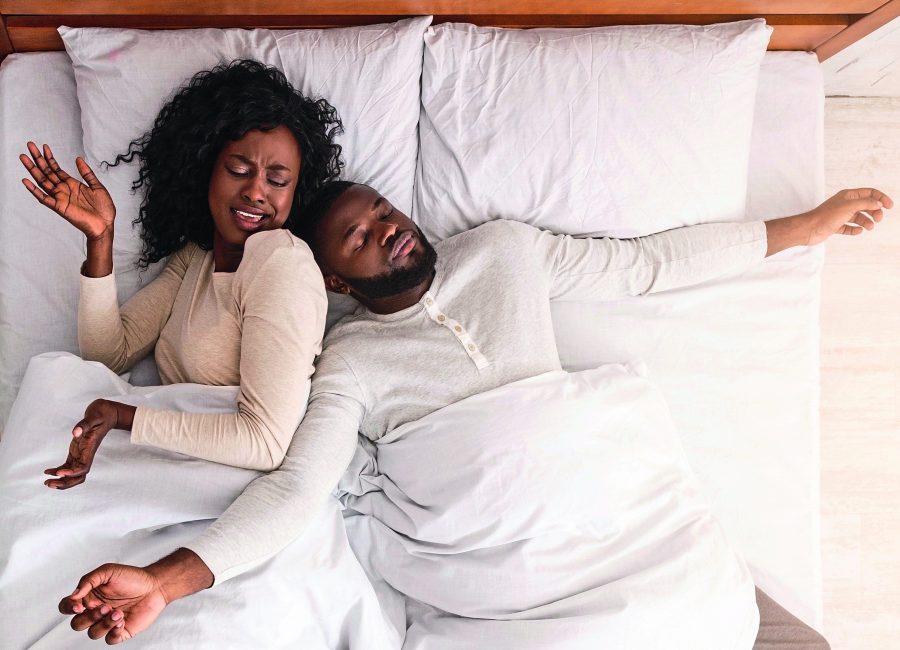If you’re lying next to a snorer, it can feel like you’re fighting a losing battle. Could separate beds be the key to a good night’s sleep, asks Camilla Foster?
In today’s wellness-focused world, where sleep is recognised as a crucial pillar of good health, ‘sleep divorces’ — by which partners choose to sleep in separate beds or even bedrooms — are becoming increasingly popular. This trend has been embraced by several celebrities, including comedian Katherine Ryan.
On a recent episode of her podcast, What’s My Age Again? Ryan chatted with her guest, columnist and author Bryony Gordon, about sleeping arrangements, and Gordon shared: ‘I like my sleep. I think sharing a bed with your husband is overrated.’
When asked by Gordon if she shared a bed with her husband herself, Ryan said: ‘I would. But he snores. He does sweat in his sleep sometimes. I prefer to sleep alone, but I would be willing to do it. But we have very small children who still wake through the night and I sleep in their room like the dog on Peter Pan.’
So how many couples are really opting for a sleep divorce, and are separate beds really the key to a good night’s sleep?
‘Good-quality sleep is crucial for both physical and mental wellbeing, increasing energy levels, improving mood, and promoting better overall health,’ says Dr Hana Patel, NHS GP and resident sleep expert at Time4Sleep.

‘A sleep divorce can help couples to address potential sleep disruptions such as snoring or restlessness.
‘If you are finding that sleeping with your partner is causing you to experience chronic lack of sleep, and you find that your health and wellbeing are suffering as a result, it may be time to consider it.’
Snoring is the number one disruption for getting a good night’s sleep, according to research by the National Bed Federation.
A survey conducted by The Sleep Council in 2009 found that less than one couple in 10 (7%) had separate beds, whereas the most recent figures suggest anything from one in six to one in four long-term couples sleep separately, suggesting the rate has more than doubled in the past 15 years.
‘Research also found that 38% of men and 36% of women quoted snoring as the number one reason for a sleep divorce,’ says Dr Ryan Cheong, an ear, nose and throat consultant and sleep surgeon at Cleveland Clinic London.
However, other factors can also disrupt co-sleeping. ‘If your bed partner is fidgeting or moving around, or if you have different sleeping patterns, these factors can potentially disrupt the quality of sleep,’ notes Cheong.
‘Also, if your partner has very strong, different preferences for their sleeping environment, like temperature, light exposure, mattress comfort or material, then that can be an issue as well.’
Is there any research that suggests the opposite — that we actually sleep better next to someone else?
‘Research suggests that there’s a 10% increase in rapid-eye-movement sleep [which is beneficial for brain function and emotional health] when we’re co-sleeping,’ explains Cheong. ‘The discussions about why this might be the case stems from the social aspect of human evolution, that we tend to be quite social creatures in nature, and having a partner, and in this case a bed partner, gives us the sense of security.’
So what can we do to improve our shared sleep environment if we’re keen to remain together in the same bed? ‘Ensure that you are having good discussions about your sleeping schedules and are optimising your sleeping environment,’ advises Cheong. ‘Make sure that the room is as dark as possible, for example.
‘Lower temperatures can also help with having a good night’s sleep. So, be mindful of the temperatures, the material of the mattress, the material
of the blanket, and the preferences of your bed partner.’
If you’ve always slept together, of course, the idea might be hard to suggest: what would be a good way to bring up the idea of a sleep divorce to a partner?
‘As long as the discussion and the request is coming from a place of respect, love and understanding, then it’s more likely to be received well by your bed partner when the subject is brought up,’ says Cheong.
Patel agrees, adding: ‘If you think that a sleep divorce may be beneficial, discuss the idea with your partner and try testing it out for a short period of time to see if it works for you.
‘Whilst some may assume that a sleep divorce hinders bedroom intimacy between couples, in fact, it can significantly enhance intimacy and the overall quality of a couple’s sex life, particularly for those in long-term relationships. This is because increased energy levels and improved mood from better sleep are important factors in encouraging a healthy libido.’
Sounds like that could keep everyone happy!







